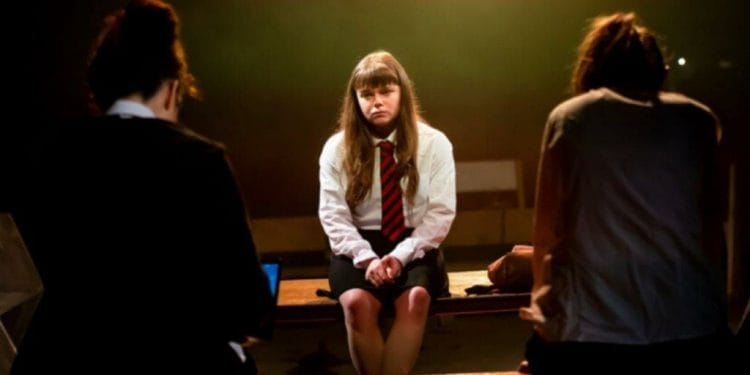 There’s a chance that you stumbled across this review from a social media site, and we all know that one of the wonderful things about the internet is finding things you didn’t even know you were looking for. But we also know there’s a darker side, and Tatty Hennessy’s Something Awful at VAULT Festival, directed by Lucy Jane Atkinson, looks at the dangers of chat rooms on impressionable young minds, and is based on a true-life crime that happened in Wisconsin.
There’s a chance that you stumbled across this review from a social media site, and we all know that one of the wonderful things about the internet is finding things you didn’t even know you were looking for. But we also know there’s a darker side, and Tatty Hennessy’s Something Awful at VAULT Festival, directed by Lucy Jane Atkinson, looks at the dangers of chat rooms on impressionable young minds, and is based on a true-life crime that happened in Wisconsin.
Ellie is the new girl at school, and despite her fiery temper and ‘bad girl’ image, quickly makes friends with Jel, a girl Sandra Dee would be proud of, and nerdy Soph, who can hack the schools Wi-Fi and is permanently glued to her MacBook. They find a common bond with a chat room where users share grisly horror stories and await the approval of their peers in the form of comments or upvotes.
The title of the play comes from the chat room that featured in the real-life ‘Slenderman’ crime, but that’s not the only link; a sleepover, a scene about blood, and reference to tentacles, all loop us back to the actual events.
The characters are particularly well written, each of them developing nicely throughout. Ellie (Melissa Parker) clearly tells lies to gain popularity, while both Jel (Monica Anne) and Soph (Natalya Martin) have different views on the newcomer in their midst. Though the building of the friendship comes across naturally, the shift in allegiances feels a touch rushed in this sixty-minute production, and a longer running time may allow for this to unfold at a more realistic pace.
Holly Ellis’s lighting design and sound from Sam Glossop combine fantastically well to make this feel like a proper thriller, building up tension without ever being unnecessarily scary. At times, Something Awful loses momentum, particularly between scenes, when there are overly long pauses to allow tables to be moved around.
In Something Awful, Tatty Hennessy has very creatively taken an already compelling story, and crafted it in to an even more suspenseful tale, with young people and the challenges they face at its heart. Well developed characters keep the audience engaged, even when the staging doesn’t manage to keep up.

















